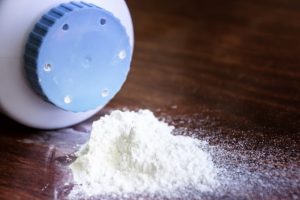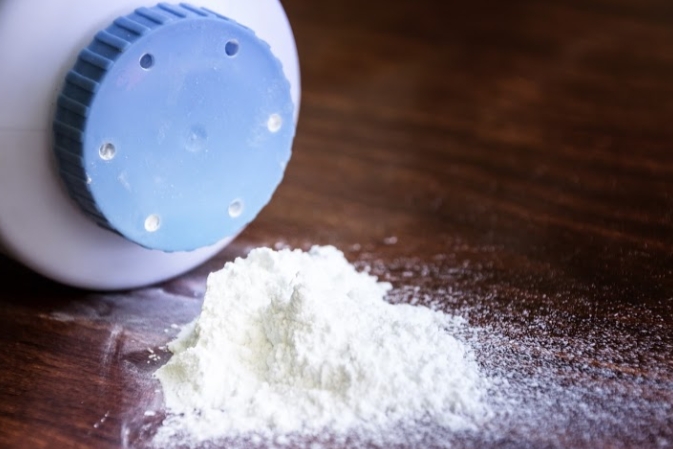For many years, a lot of people have used talcum powder for both personal hygiene and cosmetic reasons. It’s surreal to think that anyone would endanger the world’s most powerless population with dangerous asbestos in products containing talcum powder. Unfortunately, that’s what some baby powder producers continue to do.
What Is Talcum Powder?

Talc is a clay-like mineral that occurs naturally. It’s composed of magnesium, oxygen, and silicon elements. Talcum powder comes from talc, which, as mentioned, is used for both cosmetic and consumer purposes, such as adult body and baby powders, due to its potential to absorb moisture. It also helps inhibit friction, giving it the quality of preventing rashes. Additionally, industrial talc can produce plastic, roofing, paper, and rubber materials.
But, how does asbestos contaminate talcum powder? Both asbestos and talc are natural minerals that typically come about as a package in the earth. Asbestos can contaminate talc mineral during its mining, which, in turn, translates to asbestos contaminating the products made from already contaminated talc deposits.
Hidden Danger in Talcum Powder
The CTFA (Cosmetic, Toiletry, and Fragrances Association) represents the personal care and cosmetic products industry. In 1976, it provided quality guidelines indicating that all talcum used in the manufacturing of cosmetic products in the US shouldn’t have detectable levels of asbestos.
However, in recent times, most cosmetic products from talcum powder have tested positive for traces of asbestos. Exposure to asbestos can lead to the occurrence of deadly diseases, such as mesothelioma, lung cancer, and asbestosis. As such, the mineral asbestos is under regulation in the US even though it isn’t completely banned.
There’s a lot of controversies on whether pure talcum powder has potential links with cancer. In addition to that, here are also two major concerns of pure talcum powder:
- If workers under long-term exposure to talcum elements in the mines and processing plants have higher chances of suffering from lung cancer.
- If women who regularly use talc around their genitals have higher risks of getting ovarian cancer.
Does Talcum Powder Contain Dangerous Asbestos?
When holding a debate on whether or not talcum powder causes cancer, it’s crucial to separate the powder that possesses asbestos and that which is asbestos-free.
Generally, talc that contains the mineral asbestos can cause cancer if it’s inhaled. However, there isn’t clear evidence to ascertain whether asbestos-free talc poses any form of health risks.
There are two main ways on how researchers identify if a talcum powder product has dangerous asbestos.

Lab Studies
Usually, lab animals, such as rats, hamsters, and mice, or normal cells in a laboratory dish, get exposed to a talcum product in large quantities to determine if it results in cancer or other related health risks.
In previous researches, talc powders that are free of asbestos have shown mixed findings–with some not having any tumor formation and others showing. Hence, it’s not clear yet whether the results from laboratory researches apply to humans, but this method is a perfect way of ascertaining if a talcum product has asbestos or not.
Population Studies
Another way of discovering if there’s dangerous asbestos in talcum powder is through observing cancer risks among different people. This type of study compares tumor risks between a group that’s exposed to the powder and another group that’s not exposed. Alternatively, the comparison can be to the general population.
However, sometimes, it can be challenging to analyze the results of this type of study because various other factors might influence the study.
There are many suggestions that dangerous asbestos in talcum powder products causes different forms of cancer, like ovarian cancer, lung cancer, and throat cancer, to an exposed population. However, there have been no reports of increased lung cancer risks from cosmetic talcum powder.
In most scenarios, neither laboratory tests nor population studies provide adequate findings. Therefore, researchers usually use both studies when trying to identify a product with asbestos.
Seeking Justice If Exposed to Asbestos in Talcum Powder
The US Food and Drug Administration (FDA) discussed the safety of talcum powder after some researchers found traces of asbestos in some cosmetic industry giants, including Johnson & Johnson baby powder. They also formed a panel that calls for the normalization of asbestos testing in talc. Until now, it’s not a requirement for manufacturers to conduct tests for the poisonous mineral.
However, the taskforce cautions that any mineral traces in talc substances that could potentially reach the lungs are harmful. Therefore, you need to contact and hire mesothelioma attorneys to take you through the legal process in case you’re a victim.
Conclusion
Not every talcum powder in cosmetic and personal hygiene products contain asbestos. However, some of the mined talcs are naturally poisoned with the harmful mineral. Therefore, it implies that some talcum powder products are safe to use while others aren’t.
As such, you may want to be extremely cautious by limiting or avoiding the use of talcum powder products.








